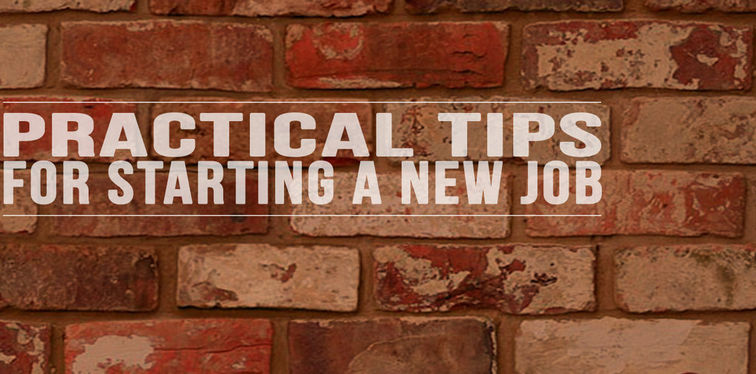As a recruitment agency, we assist countless people in their quest for a better career. And while starting a new job is an exciting experience, settling and adjusting to a new workplace can take some time.
Since moving to Exeter to head up marketing and digital media recruitment at Aptus, I feel as though I’ve been lucky to slot straight in to the team here (they might tell you otherwise). However, I am well practised having endured countless redundancies – and therefore new jobs – in my early career, and so I feel as though I’ve mastered the art of being the new guy.
The first thing to remember is that you’re always going to stand out – even more so if, like me, you’re from out of town. Your colleagues will naturally scrutinise your every move and word as they look to weigh you up: your work ethic, your overall approachability and friendliness, your annoying traits. You are very much on trial in that incubation period.
Now, I’m going to assume that you know how to keep a decent level of personal hygiene and dress appropriately. I’m also going to assume that you understand the importance of not being late and at least being able to make it look like you’re busy when at your desk.
So, now that the basics are covered, here are five practical tips on how to avoid being that new guy:
1. The Catchphrase
We all know a person that begins every sentence with the word ‘basically’ or ‘obviously’. Or someone that uses ‘literally’ at every opportunity, when metaphorically is a far more apt choice. Or those that say ‘pacific’ in place of ‘specific’.
You get the point.
If you’re going into a rather ‘banterous’ workplace – a boisterous sales force, for example – having an inadvertent catchphrase can be suicidal: team members will mock you with it, others will mimic you behind your back and even extended colleagues may greet you with it at the drinks station.
Before you know it, ‘basically’ has become your official work nickname to the point where even the management have adopted it and no-one even remembers your real name (sorry, Steve, is it?).
If you’re an outsider, there’s another thing to be wary of: your dialect. While ‘duck’ may be a term of endearment in the Midlands, much like ‘bruv’ or ‘geezer’ in London, or ‘pet’ in Newcastle, it will get picked up on when outside your hometown.
Being a northerner in Exeter, I’ve consciously avoided terms like ‘aye’, ‘reet good’, ‘proper funny’ and ‘gravy’ since arriving here. It may have helped to some extent, but the team still adopt a jovial northern accent at various points through the day – something that didn’t happen before my arrival, allegedly.
So, if you don’t want a catchphrase nickname, avoid overuse of words, enunciate properly and watch out for any rogue regional dialect.
2. The Workplace Humour
You can possibly pre-empt the sort of humour that you would expect in your new workplace. However, you can’t always be certain and trying to implement a new brand of humour is venturing into uncharted territory.
Therefore, if you’re the type of person that enjoys cracking the odd gag or two – much like the majority of us – it would be wise to gauge your audience before launching into any material that could be considered controversial.
I’ve heard a number of stories of new recruits that have come in all guns blazing with the odd ‘your mother’-esque pun. They didn’t last much longer.
The scale is magnified if you’re coming into a managerial position – any new boss trying to have a laugh with the staff will almost certainly be branded ‘David Brent’.
The wise thing to do is just to play it safe until your feet are firmly under the table. Then test the water with something marginally blue.
3. The Toilet Situation
It’s a hard one to judge, this. And probably something that mainly concerns the male side of the workforce, as women can operate with an element of stealth should they get cut short – I mean, you’re going into the cubicle either way, right?
The more brazen bloke may utilise the workplace facilities on day one, whereas I know of some lads that refuse to answer nature’s call until they’re safely at home; and they’ve been in the same job for years.
If it’s unavoidable in your first week – perhaps you’re a clockwork kind of guy – the situation certainly needs to be weighed up properly before any rash decisions are made.
Assess the cubicle’s exposure and acoustics in advance, whilst also double-checking the toilet paper supply. When the time comes, perhaps look to perform a timely flush to drown out any unwanted din from down below.
Also avoid lingering if you’re the type who embarrasses easily – those judging team-mates will be able to put two and two together.
4. The Cheese Sandwich Approach
While we’re on the subject of unsavoury smells, one of the biggest bugbears of most workplaces is that selfish employee who stinks out the whole kitchen by microwaving a fish stew for lunch.
If this is you, the chances are that your colleagues hate you and talk about you behind your back. And rightfully so too. Just stop it. Stop it now.
Now, I’m the type of person that always brings their lunch into the office. I find it to be more cost-effective and I like to think that I’m organised enough to prepare it accordingly. While I do bring the odd meal that could generate an aroma, I have a firm rule for the first few days that has been in place since redundancy number two.
Quite simply, if you want to avoid raising eyebrows, just bring in a cheese sandwich on day one and two. And not a smelly cheese either: go for a neutral cheddar. Oh, and avoid the onion pairing.
5. The Brew Rota
Getting the round in is an easy way to appease colleagues in your new job. However, you could end up overdoing it if you’re a little bit too eager.
Over consumption/production raises questions on mind-set; on the flip side, not partaking in the unwritten rota certainly won’t endear you to your new workmates either.
I prefer to get the first round in every day. Then, if you’re swamped later and can’t see the feasibility in leaving your desk, at least you can accept the brew offers without any guilt.
Adopting a set of rules to implement when you start a new job is certainly advised. Kind of like when you meet your partner’s parents for the first time. You want your colleagues to get to know the real you, but only when your quirks will be embraced – and that just comes with time. So, to conclude, being yourself is certainly encouraged, unless being yourself makes you look like an oddball. Then be a fraction of yourself until you’ve at least passed your probationary.
If you’re currently looking for a new job then click here for our latest opportunities.


